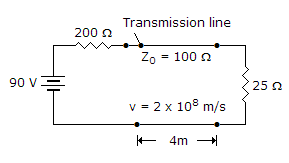ECE :: Microwave Communication
-
The reverse voltage applied to a varactor diode
-
To ensure that only dominant mode TE10 is allowed to propagate in an air filled rectangular waveguide, the lower frequency limit and upper frequency limit are
-
The transit time (in cycles) for electrons in repeller space of reflex klystron oscillator for sustaining oscillations is (n is any integer)
-
In a TWT the amplitude of resultant wave travelling down the helix remains constant
-
In an infinite line the input impedance at every point is equal to characteristic impedance.
-
Consider the following time parameters
- Domain growth time constant.
- Transit time.
- Dielectric relaxation time in positive mobility regime.
-
PIN diode has


 Whatsapp
Whatsapp
 Facebook
Facebook





